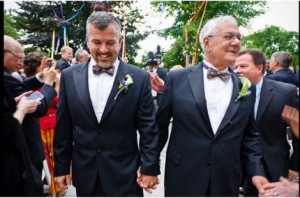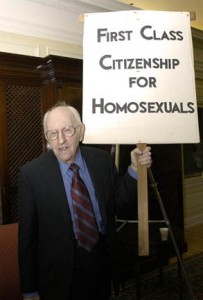In January, U.S. Rep. Barney Frank (D-MA) closes a distinguished legislative career that began at the dawn of the modern gay rights movement. Frank, who chaired the House Financial Services Committee until last year, was the first Member of Congress to come out (in 1987), and is considered America’s most prominent LGBT elected official.
Elected to the House in 1980 (with 52 percent of votes cast), he witnessed firsthand the nation’s long march to LGBT rights, culminating personally for him this summer with his marriage to his longtime partner, James Ready.
The distinguished gentleman from Massachusetts was in Greater Fort Lauderdale last month to attend this year’s “Stonewall Stars: Turning the Tide,” which was held on November 17 at The Manor Restaurant and Complex in Wilton Manors. The event was hosted by the Stonewall National Museum and Archives (SNMA) to celebrate the achievements of local and national individuals who further the cause of LGBT rights.
He spoke with the Florida Agenda in an exclusive interview just minutes prior to his historic South Florida appearance.
Where has your life intersected with the gay rights movement?
My political career and the movement for LGBT equality are about the same age. [The] Stonewall [Riots] in 1969 really begins the modern movement for the rights of sexual minorities, and I got elected to the Massachusetts legislature three years later.
I got to participate in the second gay rights parade in the history of Boston.
I filed the first legislation for gay rights in Massachusetts because the gay rights groups that were just forming asked everyone who was running that year to sponsor the legislation, and I was the only one who said “yes.”
Is there someone in American politics to whom you would like to be favorably compared?
When you are asked to evaluate yourself, you are either humble in a way that isn’t credible, or arrogant in a way that isn’t attractive.
There is one I would like to be compared to: Thaddeus Stevens [is historically] underappreciated. [He was] a Republican Senator from Pennsylvania before the Civil War who was a fierce believer in the equality of the races. He worked hard to accomplish it. He was a very pragmatic fanatic. And that’s what I’ve tried to be.
Pragmatism is procedural. I believe it is important to take strong positions. What’s key is once you’ve taken the position, once you’ve arrived with your ideals, then you should be pragmatic about implementing them.
In 1989, the House Ethics Committee investigated Frank concerning allegations that he was aware of illegal activities committed by an ex-lover. Frank requested the investigation “in order to insure that the public record is clear,” with the committee finding no evidence of Frank’s involvement, and the House voting 408–18 to reprimand him.
Efforts to expel Frank from the House were led by U.S. Rep. Larry Craig, an Idaho Republican whose own historical notoriety was assured when he was arrested in 2007 for lewd conduct while soliciting gay sex in an airport men’s room.
Craig’s disgrace and fall from politics (he did not seek re-election in 2008) were depicted in the 2009 documentary “Outrage.” The June 7, 2010 issue of Newsweek listed Craig as one of several prominent conservative officials whose careers as promoters of anti-gay legislation were bookended with gay sex scandals.
How do you think history will remember Larry Craig?
I think as a hypocrite.
In 1995, House Majority Leader Dick Armey (R-TX) referred to Frank as “Barney Fag” during a radio interview. Claiming it had been a slip of the tongue Armey tried to squash disclosure of the remark, and later attacked the news media for reporting it.
How will history recall Dick Armey?
As a very temporary phenomenon. He rose to power because the Republican Party won an election [the 1994 mid-terms] in which it didn’t have any real leaders available. He will go down, I think, as one of the most temporarily overrated people in American history.
Has President Obama’s re-election paved the way for a new political re-alignment?
The Democrats have a chance now to establish a very solid majority for two reasons: One of them is [demographics]. The other is that we are the party of government. We believe in the private sector, and the Republicans used to believe in government, too, before the “crazies” took over. The issue was, “Where is the line between the two?”
We’ve tended to want a bigger role for the government, the Republicans a bigger role for the private sector. What you have now is, we are poised I think to see people [thinking] better of government. In the first place, I think you’re going to see the economy do very well in the next four years.
I think the groundwork is laid for a successful Obama term by far. And out of that is going to become recognition on the part of the public that government does good things. Three years from now people are going to be very pleased with the [ObamaCare] health care bill. Three years from now, the financial reform bill will have been seen to be very good. The whole “issue” over LGBT rights is diminishing, and people are going to understand that we were right.
There’s one more thing I’m going to be pushing the President to do. We are now in a position, given the nature of the world, to reduce substantially our military expenditures. There is no need for us to be all over the world. That is a way for us to free up significant funds—$100 million a year—[and] we will still be a lot stronger than we need to be. We could free up $100 million a year, so that we could accomplish a lot of important things for the quality of life, through government, and still reduce deficit.
Create a “peace dividend?”
—And spend it in such a way that is [both] socially beneficial and politically beneficial.
Will you project yourself 10 years into the future—20 years, even—and tell me how you think the future of LGBT rights will look?
I believe 10 years from now we will have a national law banning discrimination in employment based on sexual orientation and gender identity. I believe people will be allowed to marry in most of the U.S., not all of it, [but] in 20 years I think all of it. And I think the fight for legal equality will have been essentially won if we keep it up.
The mistake generals have sometimes made at the point of victory is to relax. If we keep up the pressure, in 10 years we will have full legal equality.


